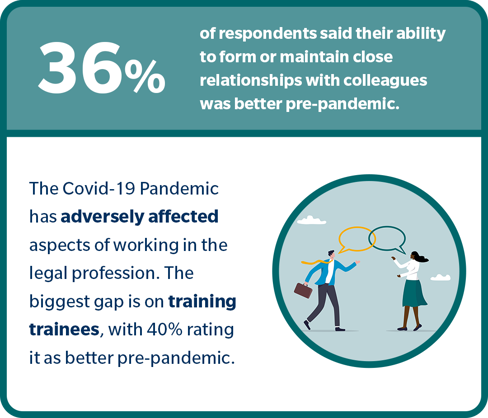Profile of the Profession 2023 findings

Survey shows mental health issues widespread in legal profession
Results from our Profile of the Profession research suggest that nearly two out of three Scottish legal professionals have experienced mental health issues in the past five years, underlining the importance of our sector-wide focus on wellbeing.
The Profile of the Profession is our major census of those working in Scotland’s legal sector. Conducted every five years, it examines equality, diversity and inclusion issues across the profession and enables us to get a unique, in-depth view of the make-up of the profession and the experiences of our members. The results of the research directly inform our policy work and how we support members.
More than 3,100 solicitors, trainees and accredited paralegals completed the survey in early 2023, making it the largest survey of its kind in Scotland. The research was carried out by independent researchers Taylor McKenzie, with all responses remaining anonymous.
For the first time, the Profile of the Profession included questions on members' wellbeing. The results revealed that mental health issues are prevalent across the legal profession, underlining the importance of the Society's sector-wide focus on wellbeing.
Nevertheless, there has been good progress in key areas including retention, earnings and levels of discrimination.

Profile of the Profession 2023

The Profile of the Profession is an important gauge of where the legal sector is at on important issues, such as equality, diversity and work-life balance. These results show there is much progress to celebrate, but also much still to do.
The results will feed into our future work and we’ll be engaging closely with the profession to tackle the issues raised. Supporting legal professionals, including their mental wellbeing, stands to benefit law firms and other employers just as much as the individuals who work there.
Following the publication of the Profile of the Profession 2023 results, the Society will seek to engage in-depth with the profession to understand the structural and cultural issues at the root of many of the challenges identified, and consider solutions that drive positive, long-term change.
If you would like to know more about the Profile of the Profession report, please contact us at diversity@lawscot.org.uk.
Previous Profile of the Profession results
Profile of the Profession 2018
The publication of the 2018 Profile of the Profession report was a landmark for us and for the legal profession. The research examined equality and diversity issues and was carried out by independent researchers Rocket Science. With over 2,700 full responses from solicitors, trainee solicitors and accredited paralegals, it was the biggest survey of its kind in Scotland.
We also published a response to its findings, setting out 28 steps that we would take to address equality and diversity issues in the legal profession, which contained comparisons with other professions.
If you would like to know more about the report or the 28 steps, please contact us at diversity@lawscot.org.uk
Read the 2018 Profile of the Profession report here
Profile of the Profession 2013/14
This major research involved a survey being sent to all members of the profession and we received 3,400 responses.
Profile of the Profession 2009/10
During 2009, we worked with the Judicial Appointments Board for Scotland and the Faculty of Advocates to conduct a survey of the Scottish legal profession to: establish baseline data on diversity; identify any potential barriers to judicial applications and elicit views about the factors which do or would encourage eligible candidates to apply.
The 'Changes in the Society's membership profile' report by MVA Consultancy compares the data from Society members across the two surveys to identify any changes in the demographic profile of solicitors since the profile of the profession research was carried out.
Profile of the Profession 2006
This project was managed by an independent organisation, The Grange Group, and involved the distribution of a questionnaire to all of our members.
Of around 10,000 members, 3,017 responded, with a good demographic match to some of the data we can already definitively identify from our database of members (such as gender and age profiles). This means we believe we have a dataset we can be confident in.
As this was the Society's first time collecting much of this sensitive data, the decision was made to make the questionnaire anonymous and use a third-party data processor so that individuals were not having to return the data to the Society itself.










